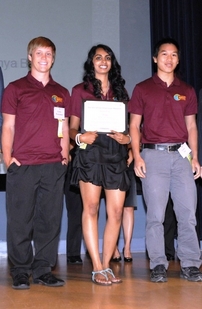
Students win national health data challenge awards

ASU computer science student Ramya Baratam (center) poses with biomedical engineering student Christopher Workman (left) and mechanical engineering student Louis Tse after winning a second-place award at the national Health Data Collegiate Challenge. Photo by: Ernie Branson/ National Institutes of Health.
Two teams that joined Arizona State University engineering and nursing students took second- and third-place prizes in a national student competition sponsored by the Institute of Medicine and the National Academy of Engineering.
In the Health Data Collegiate Challenge “Go Viral to Improve Health,” student teams had to develop social networking, mobile or web-based applications to disseminate data to foster a greater public awareness of health issues.
Team Freebee was awarded the $2,000 second-place prize for its application to spread awareness on college campuses about healthy risks such as alcoholism, smoking, unsafe sex, drug use and campus safety issues.
Nursing student Jennifer Burkmier and computer science student Ramya Baratam, along with engineering students Louis Tse, Chris Workman and Jane Lacson, developed the Freebee application.
Learn more about the Freebee application.
Team IMPAct took the $1,000 third-place award for developing a web-based interactive planner that can be used to track medical appointments. Engineering students Tania Santamaria Lyon, Taylor Baker, Edgar Sanchez, Eric Kern, and nursing student Jennifer Jost, collaborated on the IMPAct application.
Read more about the IMPAct application.
Five ASU teams – involving 25 students in all – were formed to represent ASU at the competition. The effort was organized and supported by the Engineering Projects in Community Service (EPICS) program. Now in its third year, EPICS puts engineering students – and students in other areas of study – to work helping nonprofit and community groups solve engineering problems.
Three students from each of the winning teams traveled to the National Institutes of Health campus in Bethesda, Md., to receive their awards and exhibit their projects. They were accompanied by faculty mentors Richard Filley, the director EPICS, and Anne-Marie O’Brien, a faculty associate in ASU’s nursing college.
Students had just six weeks to prepare for the Health Data Collegiate Challenge, but were aided by faculty members in ASU’s Ira A. Fulton Schools of Engineering and the College of Nursing and Health Innovation who volunteered their time to be project mentors.
Team IMPAct mentor Kim Shea says students learned the value of working with team mates who have expertise in different areas.
“You see how different the engineers’ language is from the nursing students’ language, and how important it is for each team member to contribute and ask each other to explain what they’re talking about,” says Shea, an assistant professor of nursing and an affiliate faculty member in ASU’s Department of Biomedical Informatics and Biomedicine.
“What one student didn’t think of doing in developing the project, another student did,” Shea says. “When that kind of collaboration happens, amazing things like the IMPAct app can be created in a short period of time.”
The performances of ASU’s teams at the competition are likely to spawn more collaborative efforts among students in engineering and health fields. “I’m now looking at several different ways that EPICS can build on these successes in the health care arena,” Filley says.
“The winning teams show the power of collaboration to tackle serious health issues and promote healthy habits by harnessing new technologies,” National Academy of Engineering president Charles M. Vest said in a National Academies news release.
The $3,000 first prize at the competition went to SleepBot submitted by Cooper Union for the Advancement of Science and Art, New York University and Northwestern University. SleepBot records users’ sleep habits and benchmarks them against potential risk associated with sleep deprivation.
The Institute of Medicine and National Academy of Engineering along with the National Academy of Sciences and National Research Council make up the National Academies. They are private, nonprofit institutions that provide science, technology and health policy advice under a congressional charter.
“Go Viral to Improve Health” was administered by Health 2.0, which serves as an organizer of health care technology conferences, a community of innovators, and a media network.



































